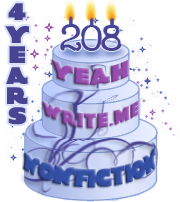My parents both came from Puerto Rico, where the tradition of the
paranda was as much a part of Christmas as the department store Santa is on the mainland U.S.
When Puerto Ricans moved from the Island to cities such as New York or Boston, they brought with them holiday traditions from home. While no one ever showed up at our home wearing a
pava or playing
plena tunes on a
cuatro, it was always understood that anyone might drop by on Christmas Eve. Invitations were not necessary, everyone was welcome, and there should and would be food enough to feed the masses. Within our culture, just dropping in on folks on Christmas Eve - which is the REAL day of celebration for Puerto Ricans; the day of big eating and drinking, and staying up late to tell stories and laugh and argue over politics and listen to music - is not seen as rude, but a part of the holiday. If anything, there's a certain pride taken by those whose homes are where the most people land and settle for the long night. If your house is the house people flock to, it means you've done things well. Your pork roast is the most succulent. Your
pasteles are moist and generous with the filling. Your
arroz con dulce is sticky and sweet and full of flavor. Your
coquito is just right. Your home is comfortable and warm and people
want to be there.
For my mother's very large family (she was one of 9 children, I have 16 first cousins) it was our house where people landed. In fact, until I was a grown woman, the idea of spending Christmas Eve anywhere
but the house my parents shared ownership of with my maternal grandparents seemed ridiculous. We never went anywhere for the holiday: everyone came to us. My mother was a phenomenal cook, and both of my parents were excellent hosts. There was always a seat at the table for anyone. Everyone's glass was always full. There was no such thing, on December 24th, as someone being unwelcome in our home. This all seemed natural to me. I thought it was how everyone celebrated the holidays. I had no idea how lucky I was, until one Christmas Eve, the events of which have stayed with me, ever since.
It is December 24th, 1977. I am ten years old. My older sister and I know the truth about Santa, but our baby sister, who is only 4, still believes. Never mind - Christmas is no less magical. Our parents, who don't have much money, never seem to let that stop them from splurging on Christmas. The kitchen is teeming with holiday food: shrimp and scallops, a giant pork roast with crispy skin, rice and peas, plantains, root vegetables. Just two days ago, I was allowed, for the first time, to take part in the making of the pasteles - the savory Puerto Rican dumplings that define Christmas for us. Long, hard work it is, making these dumplings. A labor of love that is as much social and familial as it is culinary. I am excited that my mother, grandmother and aunt have let me be part of this special circle, this year. All told, we have made 200 pasteles, each one individually wrapped in cooking parchment. Both freezers in the house are packed tightly with the bundles of two pasteles tied together with white, cotton string. The preparing of these consists of multiple steps, taking many hours and, still, they're not done. After the preparation, they need to be boiled for two hours before they can be eaten. As they boil, they emit the most wonderful aroma. This aroma, I know, will fill our home well into the new year, as we celebrate not just a day, but an entire holiday season. And celebrations, for us, mean good food.
At some point during this day, one of my mother's relatives drops by. She is a young woman, in her mid 20s. I don't want to say much about this relative, except that she is trouble, and that trouble seems to follow her, wherever she goes. It is Christmas Eve, though. There is, of course, a seat at the table for her, and for the people she has with her: another young woman, who we have never met, and the woman's 6 year old daughter, Jessica. Again, my parents come from the land of parandas: even strangers are expected on Christmas Eve. We eat dinner, and laugh and tell stories. My mother puts a Johnny Mathis album on the turntable - everyone's favorite Christmas music, because he's
her favorite.
Six year old Jessica is shy. She sits on a pillow on the floor, playing with an empty plastic jar she has brought with her. A curious plaything for a child, but we pay it very little mind. It is 8pm, and my mother's relative stands up from the table and says that she and her friend would like to run outside for a spell, and wonder if my mother would watch Jessica for an hour or so. It's so cold out, after all, and Jessica seems to be having a fine time in our home. My parents agree that, yes, of course Jessica can stay for an hour while her mother goes out. The words are never spoken, but everyone assumes that our young relative and her friend are heading out to a bar. I'm only 10, but even I know this. Jessica's mother gives her a kiss and says, "I'll be back by 9 to pick you up. You be good and do what these nice people tell you to do." Jessica seems unfazed. It's clear that being left with strangers is nothing new to her.
The two young women leave, and we all go about our business.
An hour passes. A second hour passes. Jessica's mother has not returned. My older sister and I are wide awake, as is our baby sister, who is a night owl. Jessica, though, is showing signs of exhaustion. She starts to nod off in the middle of watching Miracle on 34th Street with us. My mother brings her a pillow and blanket, takes off the little girl's shoes, and lets her sleep on the sofa, even though Jessica groggily says she needs to be awake when her mother returns to pick her up. In less than a minute, she is fast a asleep, wrapped in a blanket and hugging tight her empty, plastic jar.
More time passes. We eat a second, late-night dinner - this, too, is very much a part of what we do on Christmas Eve. More relatives come and go, eat and drink, make noise. Jessica sleeps through all of it. My parents lose track of time until the last of our relatives leaves for the night, and my mother notes that it is well past midnight and Jessica's mother has not returned. We are clearing the mess of the day, and getting ready to call it a night. My parents, of course, are actually getting ready to play Santa and pull the gifts out of hiding so that my baby sister will wake up at 6am and be amazed. What, though, shall we do about little Jessica? My dad picks the little girl up in his arms, and carries her to the room that my sisters and I share. "You big girls sleep together," he says, "you have a guest, tonight." My sister and I, who are washing dishes, exchange glances. Dad is angry, it's clear to see, but he isn't angry at us. We know - we have always known - that my mother's relative is trouble. Dad doesn't care for her, but it's Christmas Eve and, of course, she would be welcome at our table. She and her friend who, we have figured out, must also be trouble. And they've left us with a 6 year old girl.
The whole business of a white Christmas is a bit of a fairy tale. At least in NYC. We hardly ever have snow on Christmas. What we have, though, is cold weather. Very cold weather. And ice, which forms when the slushy snow from last week melts just enough and then refreezes. From the kitchen, my sister and I watch my dad as he puts on his coat, hat, and gloves, and says to our mother, "I can't believe even
she would pull something like this. She's always been bad news, but I never thought she'd do something as awful as this. It's bad enough she shows you so little respect, even though you're one of the few relatives who even lets her in the front door, but shitting all over a kid on Christmas Eve? Who the hell does that? And what about this kid's mother? I don't care if one of them
is your family, both of those women are human garbage." My mother for her part, agrees, and hands him the few dollars she has in her change purse, "This is the last time," she says, "I've given her so many chances, but this is too much." Dad notices us watching from the kitchen, and smiles at us, "Don't stay up to late," he says, "or Santa Claus won't come." He says this with a look of mischief, pronouncing "Santa Claus" the way one does in Spanish.
There is a rush of cold air when Dad opens the big, front door and goes out into the cold, early morning street. "Where's he going?" I ask. "To Neergaard's Pharmacy," Ma answers, putting the last of the dishes away, "Thank God that place is open 24 hours, even on Christmas. I won't have a little girl waking up in our home on Christmas morning without a damned thing for her under the tree. Some people should
not have children." Like Dad, Ma is angry about this. Very angry. She smiles at us, though, and tells us to get to bed. "If you want to give me a nice gift," she says, "don't get up too early. Your dad and I are hardly going to get any sleep, as it is."
It's just before 6 when I wake up. I shake my older sister, with whom I'm sharing a bed. It's too early, she informs me. We should wait until 7. I half-heartedly agree, but our baby sister is awake only a few minutes later, and then all bets are off. She opens her eyes, jumps out of bed to shake us both, and asks us if Santa has been. It's just the excuse I need to get up and see what's under the tree.
The rule in our family is no opening gifts until Ma and Dad are up to supervise. All these years, later, I realize they wanted to be able to see the look of wonder in our eyes, and enjoy the fruits of their labor. In 1977, when I am just 10, I think it's just a silly rule that makes no sense. I've promised to let Ma have a bit of a sleep-in, but my baby sister has made no such promise. I tell her she needs to go "make sure Ma and Dad are awake" - my roundabout way of sending her in to ruin their few, precious hours of rest, and demand that we be allowed to start opening gifts. It works, of course and, in a few minutes, my sisters and I are at the tree, opening gift after gift. So many of them! The ones I remember: a set of thick magic markers in a carrying case, a beautiful, brightly-colored insect preserved in a glass frame (this is from Dad, who always gives me very adult gifts), a brown hat, gloves and scarf which are just like the ones my mother wears (this makes me happy - I want to be like my mother, in all ways), a book called Draw 50 Animals and, best of all, a radio with built-in cassette player and a box of blank TDK cassettes. It's a frenzy of ooohs and ahhhhhs and wrapping paper, as we open gift after gift. We forget all about Jessica, who we've left sleeping in our bedroom, until she appears at the entry to the living room. Her clothing, which she's had on since the day before, is all wrinkled. She looks lost, standing there, holding on to that plastic jar for dear life. My sisters and I stop. Everything stops for a moment, until Dad says, "It's about time you woke up, kiddo. I ran into Santa when he was here, last night, and he said he was going to leave something for you." Ma pulls a package out from under the tree. It's about the size of a shoebox, and wrapped in paper that doesn't match any of the other gifts. "Oh, look," she says, "This has your name on it. Santa knows where to find kids."
We watch as Jessica slowly unwraps the gift and then breaks into a smile when she finds that Santa has left a Barbie doll for her under our tree. Jessica is thrilled with her gift. My older sister and I know that Dad has bought the only thing he could find at a 24 hour drug store at 2am; both of our parents hate Barbie, and are always saying how glad they are that none of us show any interest in such an annoying doll.
When the business of opening gifts is over, we sit down to a breakfast of cafe con leche, farina, bacon and eggs, Italian bread with butter. This is followed by a long morning and early afternoon of trying out my new radio/tape player, drawing with the set of markers, learning to use sister's new typewriter. Jessica never asks about her mother, and none of us say anything about her, either. We eat a lunch of pasteles and leftovers, and I hear my father say quietly, in Spanish, "I don't care if she
is your relative. If those two aren't back by 5 to pick this poor kid up, I'm calling the police." My mother answers, "No you won't. Because I will."
At 3:00, when Jessica is on the floor, taking off Barbie's dress, and I am sitting at the kitchen table, waiting for my favorite song to come on the radio, so I can record it, the doorbell rings. Everyone stops what they're doing and looks up. My parents both stand up and Dad says, "You kids stay here." He and Ma go downstairs to answer the door. My older sister and I wait until they are at the bottom of the landing before scurrying to the spot in the hallway from which we know we will be able to hear and see everything, without being noticed. We get there just in time to hear Ma say, "You've got a damned nerve showing up
now, after what you've done. What is wrong with you people?" We hear, too, Dad using language we've never heard from him: "How the fuck can you call yourself a mother? What kind of fucking degenerate abandons her kid on Christmas Eve and leaves her with total strangers?" And then there are words from the other side. Jessica's mother saying that no one had better tell her how to raise
her baby. Our relative telling some story about trouble on the subway. Even at 10 years old I know it's a preposterous story and a weak lie. Subway breakdowns don't delay people for 18 hours. Even if they did, real parents don't run off on their kids on Christmas Eve. The sound of the voices rises, and I can hear my mother saying to her relative, the one who is always so much trouble, "I
know you don't think you're coming here to
eat, after pulling this stunt. You must be out of your cotton-pickin' mind. You're not even coming in this house." And then my mother shuts the front door, leaving her relative on our stoop, and allowing in only Jessica's mother, who trails behind my parents as they start climbing the steps. My sister and I rush back to the living room, so as not to be caught eavesdropping.
A moment later, Ma and Dad walk into the room. Jessica sees her mother behind them and jumps up, looking so happy. "Mommy!" she says, holding up the Barbie doll, "Look what Santa brought me! He knew I was here even though nobody told him." Jessica's mother rips the doll from her little girl's hand, throws it on the floor and says, "Leave that piece of shit here. You don't need these people's fucking charity. Get your coat."
Jessica stops smiling. She picks up the plastic jar, which has been on the floor all day, walks out into the hallway to grab her coat off the bannister, and follows her mother down the steps and out the door.
We never see Jessica, again. I have no idea what became of her. I can't imagine what
must become of a little girl whose life is that toxic when she's only 6 years old. If she made it to adulthood alive, I can't imagine it is without being tragically broken. I don't even know her last name, but I think about her every Christmas Eve.




















